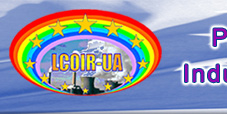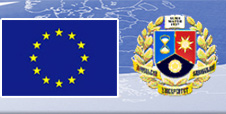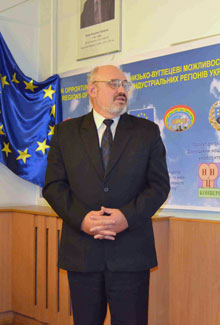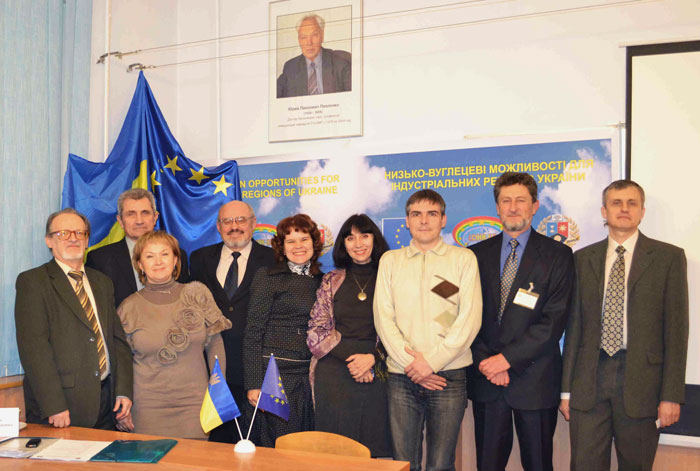Roundtable
“LOW-CARBON INNOVATIONS FOR THE SOLUTION OF
REGIONAL ENVIRONMENTAL PROBLEMS”
December 15, 2011, a Roundtable “LOW-CARBON INNOVATIONS FOR THE SOLUTION OF REGIONAL ENVIRONMENTAL PROBLEMS” was held in Zaporizhzhya State Engineering Academy (ZSEA) within the VI² Ukrainian scientific-practical conference “Protection of the environment of industrial areas as a condition for the stable development of Ukraine”. The Roundtable was held by Donetsk National University (DonNU) within the project on “Low-Carbon Opportunities for Industrial Regions of Ukraine (LCOIR-UA)” funded by the European Union.
Before the Roundtable, at the plenary session of the conference the report by Bespalova S.V., Shestavin N.S. on “LOW-CARBON OPPORTUNITIES FOR INDUSTRIAL REGIONS OF UKRAINE: ADAPTATION OF EUROPEAN EXPERIENCE”, highlighting the main objectives, tasks and expected outcomes of the project LCOIR-UA was made. In the report the target groups were defined and the choice of target regions for implementation of the project results – Donetsk, Dnipropetrovsk, Zaporizhzhya, Luhansk and Kharkiv oblasts of Ukraine – was justified. The preliminary results of evaluation of possibilities for introduction of clean coal technologies and technologies for capturing and geological storage of CO2 in Ukraine were presented, including the rationale of their introduction at the enterprises of the power, industrial and agricultural sectors of the economy of Ukraine.
The Roundtable started after the plenary session and brought together over 40 representatives of central and local self-governmental authorities, industrial and energy companies, scientists of universities and research institutes of Zaporizhzhya and Dnipropetrovsk oblasts.
The following issues were discussed at the Roundtable:
- Links between the ecological state of the environment and the prospects of global warming;
- Adapting to climate change, mitigation of the climate change consequences, and the prospects of climate stabilization;
- Energy-saving technologies, renewable energy and energy management;
- Introduction of cleaner technologies in industry and agriculture of Ukraine, as well as clean coal technologies in power engineering, metallurgy and chemical industry of Ukraine;
- Technologies for capture, transport and geological storage of CO2;
- Investments to climate stabilization: trends, risks, socio-economic efficiency.
The Roundtable was opened with the welcoming speeches by the rector of ZSEA Vladimir Pozhuev and the head of the Department for Environmental Safety of Zaporizhzhya City Council Gleb Zolotarev. Then, the project coordinator Mykola Shestavin (DonNU, Donetsk) made an overview report on “Global climate change and regional environmental problems” illustrating the basic causes and prospects of climate change, the contribution of Ukrainian enterprises of different sectors – metallurgy and other industries, agriculture and transport – to the “Carbon Footprint”.
Gennady Kozhemyakin, the head of the Department of Environment of ZSEA made the presentation on “Assessing the ecological state of Zaporizhzhya oblast” highlighting the state of air pollution, water and soil enterprises of Zaporizhzhya oblast and showed the main causes of environmental problems in the region.
Alina Solnyshkina, the deputy Chairman of the Council of Young Researchers of Dnipropetrovsk oblast, in her presentation “Environmental problems of Dnipropetrovsk oblast in the context of socio-ecological knowledge” analyzed the environment of Dnepropetrovsk region and stressed the major causes of environmental degradation.
During the coffee-break the presented reports and the poster on “Low-carbon opportunities for industrial regions of Ukraine: the adaptation of the European experience” presenting the goals, targets and achievements of the LCOIR-UA project implemented by DonNU - were discussed.
Mykola Shestavin (DonNU, Donetsk) in his next presentation on “Prospects of introduction of climate innovations in Ukraine, including clean coal technologies and technologies for carbon capture and storage” focused on the possibilities of implementation of the European experience of climate change adaptation and mitigation at the Ukrainian enterprises.
Oleksandr Lyashenko, the Head of the Laboratory for Agroecology (Institute of Animal mechanization of the National Academy of Agrarian Sciences of Ukraine (Zaporizhzhya) in his report “Environmental aspects of agricultural production: the state, the latest technology and equipment of organic waste” focused on technological issues of CO2 emissions reduction during biomass processing.
Oleg Skrypnik, senior researcher of the Institute of Nature Management and Ecology of the National Academy of Sciences of Ukraine (Dnepropetrovsk) in his collective presentation (co-authors Shapar A.G. and Smetana S.N.) “Carbon deposition in the formation of secondary ecosystems disturbed by mining activities lands” stressed the importance of rehabilitation of lands used in the mining and metallurgical industries for reduction of CO2 amount in the atmosphere.
During the coffee-break the reports and the poster of “Climate Change Building” (DiploFoundation, Malta) and “Calendar-2012” – designed on the basis of this poster, were discussed.
Then the brief presentations on the possibilities of participation in European research and technology projects were made by Stanislav Syelin (Zaporizhzhya State Center for Science, Innovation and Informatization) – “HORIZON 2020: A new framework for the European Union research and innovation”, Mykola Shestavin (DonNU, Donetsk) – “Presentation of the National Contact Point in Environment, including climate change”, Oleksiy Savkevych (DonNU, Donetsk) – “Presentation of the National Contact Point on Mobility”. The reports attracted the interest of the scientists who received answers to many questions on the capabilities and rules of participation in FP7 projects. The Roundtable was ended by the general discussion of reports and summarizing the discussion.
Photo report of the meeting of the Roundtable:
|











